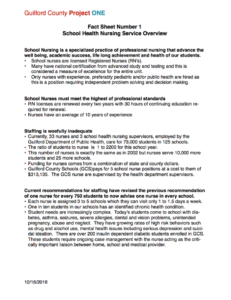School Nursing is a specialized practice of professional nursing that advance the well being, academic success, life long achievement and health of our students.
- School nurses are licensed Registered Nurses (RN’s).
- Many have national certification from advanced study and testing and this is considered a measure of excellence for the entire unit.
- Only nurses with experience, preferably pediatric and/or public health are hired as this is a position requiring independent problem solving and decision making.
School Nurses must meet the highest of professional standards
- RN licenses are renewed every two years with 30 hours of continuing education required for renewal.
- Nurses have an average of 10 years of experience
Staffing is woefully inadequate
- Currently, 33 nurses and 3 school health nursing supervisors, employed by the Guilford Department of Public Health, care for 73,000 students in 125 schools.
- The ratio of students to nurse is 1 to 2200 for this school year.
- This number of nurses is exactly the same as in 2002 but nurses serve 10,000 more students and 25 more schools.
- Funding for nurses comes from a combination of state and county dollars.
- Guilford County Schools (GCS) pays for 5 school nurse positions at a cost to them of $313,135. The GCS nurse are supervised by the health department supervisors.
Current recommendations for staffing have revised the previous recommendation of one nurse for every 750 students to now advise one nurse in every school.
- Each nurse is assigned 3 to 5 schools which they can visit only 1 to 1.5 days a week.
- One in ten students in our schools has an identified chronic health condition.
- Student needs are increasingly complex. Today’s students come to school with diabetes, asthma, seizures, severe allergies, dental and vision problems, unintended pregnancy, abuse and neglect. They have growing rates of high risk behaviors such as drug and alcohol use, mental health issues including serious depression and suicidal ideation. There are over 200 insulin dependent diabetic students enrolled in GCS. These students require ongoing case management with the nurse acting as the critically important liaison between home, school and medical provider.
When the nurse is not in the school teachers and staff fill the void.
- Staff, trained by the school nurse administers physician prescribed medications. These meds, some of which require mixing before being given, may need to be administered orally, injected, given rectally.
- Special procedures, such as urinary catheterization, tube feedings, blood sugar checks, and emergency Epi-Pen administration can also be done by nurse trained staff.
- The nurse, however, is responsible for collecting relevant information, developing a care plan for the individual student. The nurse also instructs teachers, office staff and emergency first responders and bus drivers with delegation of tasks in accordance with the NC Board of Nursing Delegation Tree Directive.
School Nurses provide a number of other essential community and public health functions.
- They monitor required immunization compliance and oversee communicable disease
investigation and control. - They are a resource to school service teams screening students for Exceptional Children Services and work cooperatively with other health related providers (physical therapists, occupational therapists, speech and hearing therapists, nutrition providers, social workers)
- When time allows, they conduct classes on fitness, hygiene, nutrition, and promote school safety.
- They are often the point of entry into today’s complex health care system, working with students who have no consistent medical home or who face language, economic or social barriers.
Bottom line is this: a school nurse is THE health professional in the school uniquely qualified to assess a student’s health needs, provide or refer for needed intervention, using knowledge of community and financial resources so that the student’s needs can be met.
- Nurses deal with this whether the problem arises from acute illness, accident at school
or from a complex health condition. - Improved school nurse rations with at least one nurse for every 750 students and as well as one nurse in every school has been shown to positively impact health, school attendance and ultimately academic achievement.
Good health is necessary for academic success and nurses make good health happen. Period.
